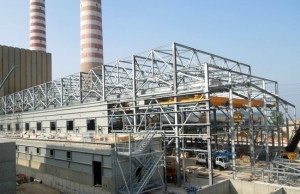خطة طوارئ لإنقاذ قطاع الكهرباء
يعاني قطاع الكهرباء مشكلات عدة ومصاعب لا تزال تلقي بثقلها على الاقتصاد اللبناني عموماً، وعلى موازنته خصوصاً، على الرغم من الخطط التي وضعتها الوزارات المتعاقبة، كانت آخرها الخطة التي اقرها مجلس الوزراء في حزيران 2010. وتتشعب مشكلات القطاع من الانتاج الى التوزيع الى الجباية، على الرغم من تلزيمها الى الشركات الخاصة.
يحتاج هذا القطاع الحيوي اولاً الى القرار السياسي، وثانياً الى إبعاد المصالح الشخصية والآنية عن معالجة مشكلاته. لذلك نرى ضرورة احترام القوانين الصادرة عن مجلس النواب وتنفيذها عبر:
1 – بت كل الاشكالات المالية والادارية، مع متعهد اشغال بناء معمل جديد في دير عمار بقدرة 435 ميغاواط في اسرع وقت ممكن والطلب اليه بدء التنفيذ فوراً، على ان يترافق ذلك مع تكليف مجلس الإنماء والاعمار العمل على تأمين المال اللازم من طريق الصناديق والمؤسسات الداعمة لتنفيذ معمل جديد بالقدرة ذاتها في حرم معمل الزهراني، لتوفير الحد الادنى من الطاقة الكهربائية التي يحتاج اليها لبنان حالياً.
2 – الاسراع في استلام الوحدات التي جرى تلزيمها في معملي الذوق والجية وتشغيلها، تمهيداً لوضعها في الخدمة.
3 – التعجيل في تعيين هيئة تنظيم قطاع الكهرباء، وبدء تطبيق القانون 462/2002 بعدما عطّل تنفيذه على مدى اكثر من 14 عاماً، من دون سبب قانوني او شرعي وبمزاجية الخوف على صلاحيات مزعومة للوزير اذا ما مارست الهيئة استقلاليتها.
ان صدور القانون رقم 288 تاريخ 30/4/2014 يدل بطريقة لا شك فيها، الى ان الحكومة عجزت بشكل كامل عن تطبيق القانون 181/2011، فلجأت الى اصدار قانون ليحل مجلس الوزراء محل هيئة تنظيم قطاع الكهرباء، بعدما عجزت الحكومات المتعاقبة عن تعيين هيئة من خمسة اشخاص أو أنها لا تريد، وبشكل فاضح تطبيق القوانين الصادرة عن مجلس النواب.
4 – التطبيق الاستنسابي لمواد القانون 181/2011 جعل منه اداة طيعة، وما زاد الأمر سوءاً عدم تنفيذ كامل الشروط التي وضعها القانون 181/2011 فلا تعديلات أدخلت على متن القانون 462/2002 خلال الاشهر الثلاثة، ولا حتى في اربع سنوات. كما لم يعيَّن مجلس ادارة جديد لكهرباء لبنان ولم يتابع انجاز المشاريع التي لزِّمت وألزمت لبنان بمبالغ مالية ضخمة.
5 – بناء معملي الزهراني ودير عمار، بنيا اصلاً، تنفيذاً لخطة نهوض وطني وضعت عام 1994، ليعملا على الغاز الطبيعي وليس على الديزل أويل، بناء على نصيحة من شركة كهرباء فرنسا، لما يؤمنه استعمال الغاز الطبيعي في انتاج الطاقة من وفر في كلفة الانتاج، وتخفيف الضرر على البيئة، لكن المناكفات السياسية والمزاجيات الشخصية لبعض المسؤولين منذ عام 2002 عطّلت المشروع، ما كبّد الخزينة مبالغ طائلة عن مشتقات نفطية.
ولئن تشغيل معامل الكهرباء على الغاز الطبيعي بات متعذراً من دون وجود محطات تخزين وتسييل الغاز الطبيعي بالقرب من معامل الانتاج امراً لا بد منه، ولا بديل منه، اصبح لزاماً على الدولة ان تبدأ شراء او استئجار او إنشاء محطة عائمة لتخزين وتسييل الغاز الطبيعي لزوم معملي الانتاج في الزهراني ودير عمار، بحيث تقام محطة عائمة في كل منهما ولو احتاج ذلك الى توسيع المرفأ أو انشاء سد للأمواج لحماية المحطة من العوامل البحرية.
توازياً، ان انشاء المحطتين يؤدي الى وفر هائل في ثمن المحروقات، ما يؤدي بدوره الى خفض الدعم لمؤسسة كهرباء لبنان وتخفيف نسبة الدين والفوائد المترتبة عليها، خصوصاً ان إمكانات الدولة ومؤسسة كهرباء لبنان، في مجال جباية مستحقاتها ومنع الاعتداء على شبكاتها لا تزال قاصرة، ما يخفض قدرتها على لجم العجز او مواجهته بتفعيل الجباية.
ونرى من الافضل استئجار محطة عائمة في كل معمل، على ان يكون المورِّد صاحب خبرة عالمية في هذا المجال، ولديه القدرة على أن يورّد الغاز الطبيعي، بالاضافة الى المحطة في الوقت نفسه.
أخيراً، ان ملفاً بهذا الحجم الوطني والخطورة في حال استمراره يستحسن ان يكون برعاية رئيسي مجلسي النواب والوزراء في الوقت الحاضر، خصوصاً ان الرئيس نبيه بري ابدى اهتماماً واسعاً في انقاذ القطاع ولم يوفِّر جهداً في هذا السبيل، على ان تتم مقاربته بشفافية وتقنية وحس وطني مسؤول لانقاذه وحماية الخزينة من تداعيات الاهدار الناتج منه، وتفادي الخسائر التي تتكبدها الدولة جراء معالجته.

